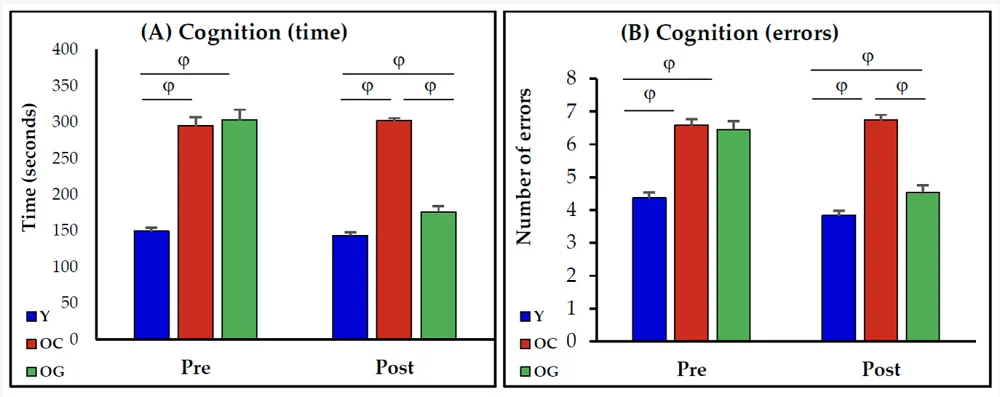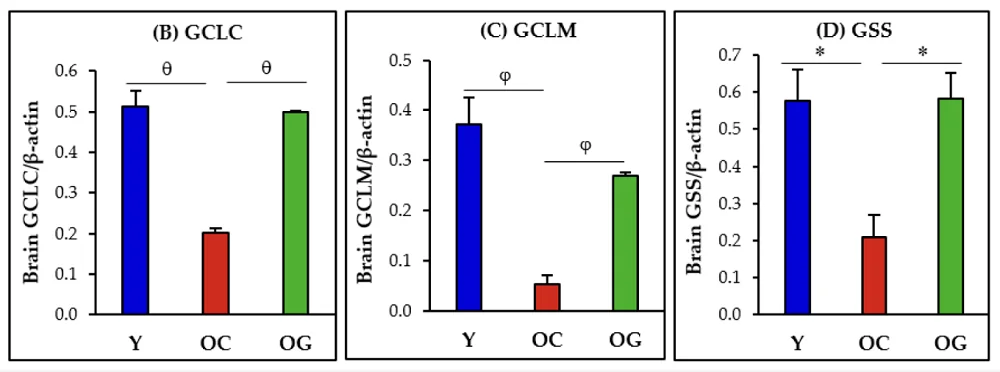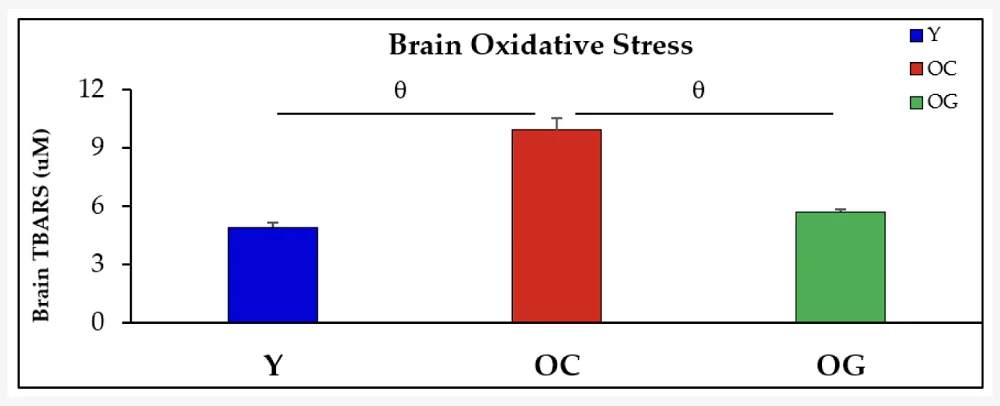Glycine and Cysteine Combo Rescues Cognitive Decline in Mice
- There appeared to be strongly positive effects on oxidative stress.

Scientists publishing in Antioxidants have reported that increasing glutathione levels with GlyNAC, a supplement that combines glycine and cysteine, significantly reverses age-related cognitive decline in naturally aged mice [1].
GlyNAC vs oxidative stress
Oxidative stress caused by reactive oxygen species (ROS) is known to be one of the upstream causes of aging and contributes to multiple aging processes, such as inflammation and mitochondrial dysfunction [2]. Cells have built-in antioxidant mechanisms, but like all our defenses, they get weaker with aging. In particular, the levels of glutathione, which is thought to be the most important antioxidant, decline significantly.
This paper considers a combination of two glutathione-precursor amino acids, glycine and cysteine, as a possible solution to dwindling glutathione levels. GlyNAC is a formulation that contains glycine and cysteine, which is provided as N-acetylcysteine for improved bioavailability. Glycine and NAC are commercially available as separate supplements or combined as GlyNAC. Lifespan.io does not endorse any particular supplement or brand.
Cognitive abilities, including memory, problem-solving, processing speed and conceptual reasoning, inevitably decline with aging as well. This process, age-associated cognitive decline (ACD), is not currently treated as a medical pathology despite its deleterious effects, unless it takes more serious forms such as Alzheimer’s disease.
Some previous research into GlyNAC supplementation, including by the group that authored this new study, showed improvements in various biomarkers of aging and cognitive abilities in animal models and humans [3]. In this new study, the authors focused on the effects of GlyNAC on the brain. Since brain biopsy in humans was out of the question, the researchers worked on naturally aged B6 mice, a popular model in longevity research.
Dramatic reversal
24 male mice were equally divided into three groups: young controls, old controls (90 weeks), and the study group: old mice that received GlyNAC supplementation for 8 weeks. Cognitive performance at baseline and calorie intake during the study were similar between the study group and old controls.
GlyNAC supplementation had a profound effect on cognitive function in an 8-arm radial maze test, which measures spatial working memory and reference memory, restoring the performance of old mice to almost youthful levels:

The same happened to glutathione in the brain: while old controls had 69% lower glutathione levels compared to young mice, this gap was all but eliminated by GlyNAC. The researchers also assessed glutathione synthesis in the brain by measuring the expression levels of three enzymes involved in this process: GCLC, GCLM, and GSS. Deep age-related deficits were completely eliminated for two of the enzymes and significantly ameliorated for the third:

Amazingly, the same picture was recorded for oxidative stress levels in the brain, as measured by thiobarbituric acid reactive substances (TBARS):

Mitochondrial energy production generates a lot of ROS that harm the mitochondria. Indeed, mitochondrial function and ATP production were greatly impaired in the brains of old mice. However, markers of mitochondrial function were restored by GlyNAC supplementation.
Oxidative stress is also known to impair the clearance of cellular junk (autophagy) and the targeted degradation and clearance of dysfunctional mitochondria (mitophagy). The GlyNAC treatment was able to completely reverse the age-related decline in the autophagy marker LC3A/B and the mitophagy marker PINK1.
Other important markers of cognitive decline that were completely or mostly rescued by the treatment include impaired glucose uptake by the brain, neuroinflammation as measured by the protein TSPO, increased genomic damage as measured by the histone protein pH2AX, and a decline in the levels of the neurotrophic factors BDNF, GDNF, and NGF.
Interestingly, while overactivation of microglial cells is often proposed as a cause for neuroinflammation, levels of microglial activation as measured by the protein Iba1 did not differ significantly between all three groups.
To be continued
This study comes on the heels of a human study that showed positive effects of GlyNAC supplementation, but it has the added value of directly analyzing the brain. The small sample size (8 mice per group) is counterbalanced by the impressive effect size, although we would still like to see a larger study.
The all-male study design is not ideal as well, since we know that there is sex-related heterogeneity in aging. However, a previous study by the same group showed a sex-independent increase in the lifespans of GlyNAC-supplemented mice [4].
Another interesting question would be whether GlyNAC supplementation, or other ways of increasing glutathione levels in the aging brain, can prevent age-related dementias, but answering that requires much more powerful and long-term studies.
Literature
[1] Kumar P, Osahon OW, Sekhar RV. GlyNAC (Glycine and N-Acetylcysteine) Supplementation in Old Mice Improves Brain Glutathione Deficiency, Oxidative Stress, Glucose Uptake, Mitochondrial Dysfunction, Genomic Damage, Inflammation and Neurotrophic Factors to Reverse Age-Associated Cognitive Decline: Implications for Improving Brain Health in Aging. Antioxidants. 2023; 12(5):1042.
[2] Liguori, I., Russo, G., Curcio, F., Bulli, G., Aran, L., Della-Morte, D., … & Abete, P. (2018). Oxidative stress, aging, and diseases. Clinical interventions in aging, 757-772.
[3] Kumar, P., Liu, C., Hsu, J. W., Chacko, S., Minard, C., Jahoor, F., & Sekhar, R. V. (2021). Glycine and N-acetylcysteine (GlyNAC) supplementation in older adults improves glutathione deficiency, oxidative stress, mitochondrial dysfunction, inflammation, insulin resistance, endothelial dysfunction, genotoxicity, muscle strength, and cognition: Results of a pilot clinical trial. Clinical and Translational Medicine, 11(3), e372.
[4] Kumar, P., Osahon, O. W., & Sekhar, R. V. (2022). GlyNAC (glycine and N-acetylcysteine) supplementation in mice increases length of life by correcting glutathione deficiency, oxidative stress, mitochondrial dysfunction, abnormalities in mitophagy and nutrient sensing, and genomic damage. Nutrients, 14(5), 1114.







